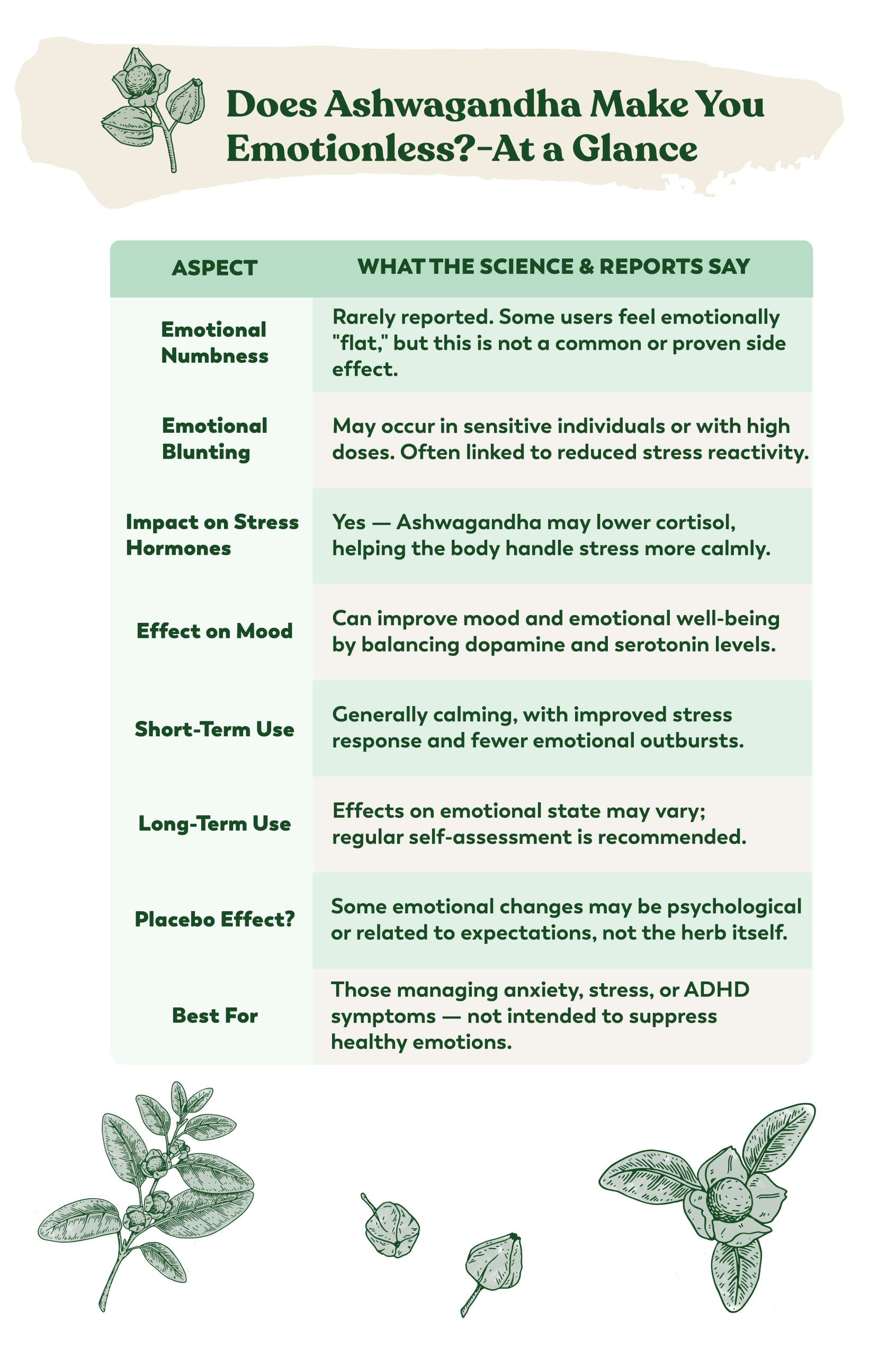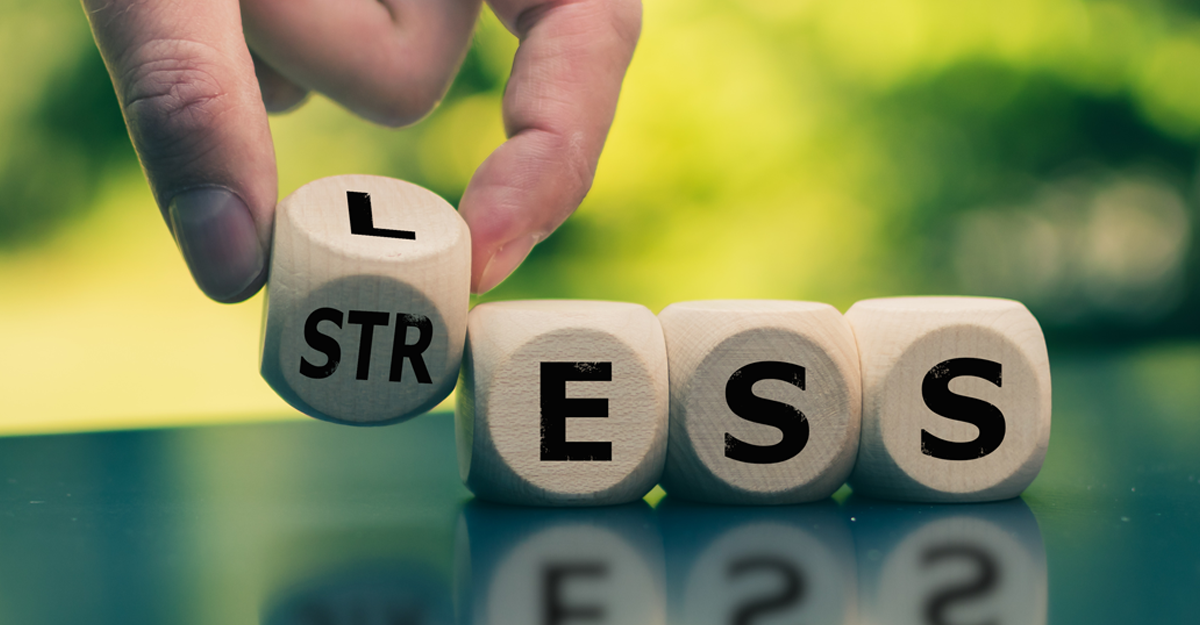
Many people are turning toward ashwagandha, a popular herbal supplement, to help with health concerns such as anxiety, stress, and trouble sleeping. But could these efforts be doing more harm than good? Some users are starting to ask, “Does ashwagandha make you emotionless?” The answer depends on individual brain function, dosage, and the duration of use.
What is Ashwagandha?
Ashwagandha (Withania somnifera) is an ancient herb that has been used for thousands of years in traditional Ayurveda and Indian medicine. This adaptogenic herbal supplement has gained modern popularity for its potential health benefits, particularly its ability to help the body manage its stress response.
The National Institutes of Health Office of Dietary Supplements notes that ashwagandha has been traditionally used as an adaptogen, enhancing a person’s ability to resist, adapt to, or become resilient against biological, physical, or chemical stressors. Many people explore the use of ashwagandha as a natural way to combat mental health concerns such as anxiety and depression. However, some wonder if it works too well in dampening emotional responses.
Understanding Ashwagandha’s Effects on Stress Hormones
Ashwagandha works by influencing the body’s stress response system, particularly through its effects on cortisol, one of the primary stress hormones. Research has shown that this herb exhibits neuroprotective, sedative, adaptogenic, and anti-inflammatory properties. When cortisol levels are elevated due to chronic stressors, individuals often experience heightened anxiety, difficulty sleeping, and mood disturbances.
Several high-quality ashwagandha supplements are available for individuals seeking to support their stress management regimen.
Ashwagandha Supplements from NHC
- Integrative Therapeutics Cortisol Manager from Integrative Therapeutics combines ashwagandha with other ingredients designed to promote healthy cortisol patterns.
- Zahler Ashwagandha 600 from Zahler delivers a clinically validated 600 mg dose of KSM-66 organic ashwagandha root extract per serving, standardized to support mental energy and relaxation. This full-spectrum extract provides a robust dosage that may help promote a balanced stress response while maintaining mental clarity.
- Pure Encapsulations Ashwagandha from Pure Encapsulations contains 500 mg of ashwagandha root extract standardized to 2.5% with anolides, the key active compounds in ashwagandha. This hypoallergenic formula supports the body’s ability to manage occasional stress while promoting joint health and healthy brain function.
- Standard Process Ashwagandha Forte from Standard Process features a concentrated 10:1 ashwagandha root extract providing 400 mg per tablet, standardized to contain 10mg of withanolides. This traditional Ayurvedic preparation supports the body’s natural immune system and healthy cognition, and it serves as a nervous system relaxant.
- Himalaya Ashwagandha Organic from Himalaya combines three forms of USDA Certified Organic ashwagandha—root powder, root extract, and supercritical CO2 extract—totaling 670 mg per caplet with naturally occurring withanolides. This comprehensive formula supports adrenal function, energy levels, and the body’s stress response without acting as a stimulant.
- Gaia Herbs Ashwagandha Gummies from Gaia Herbs offers a convenient, naturally sweetened option with 600 mg of USDA Organic ashwagandha root extract per three-gummy serving, enhanced with organic cinnamon and ginger. These gummies promote resistance to stress in a pleasant, easy-to-take format made with real fruit concentrates and no refined sugar.
Does Ashwagandha Numb Emotions?
The question “Does ashwagandha make you emotionless?” requires a nuanced answer. One randomized, double-blind, placebo-controlled study found that adults with chronic stress who took 300 mg of high-concentration ashwagandha root extract twice daily for 60 days experienced substantial reductions in serum cortisol levels compared to the placebo group. For individuals dealing with chronic stress and anxiety, this reduction in stress hormones often translates to feeling calmer and less reactive to emotional triggers.
However, experiencing reduced emotional intensity is not the same as becoming emotionless. The supplement may help modulate extreme emotional responses without eliminating emotions. Nevertheless, some individuals report what they describe as emotional blunting or emotional numbness during supplementation, though these emotional effects are not universal.
Clinical research examining ashwagandha’s neuropsychiatric effects has documented that both root and leaf extracts exhibited noteworthy anti-stress and anti-anxiety activity in animal and human studies. The herb’s active constituents include alkaloids and withanolides, which one study suggests are responsible for its effects on brain function and emotional well-being.
The experience of emotional changes while taking ashwagandha may also be influenced by factors beyond the supplement itself. In some cases, perceived shifts in emotional state could be related to placebo effects, reduction in external stressors, or simply the body adjusting to a calmer baseline after prolonged periods of heightened stress.
Does Ashwagandha Lower Cortisol?
Clinical trials have confirmed that ashwagandha supplementation can significantly reduce serum cortisol levels. One study, in particular, showed substantial reductions in cortisol levels in the ashwagandha group compared to the placebo group. A 2021 systematic review identified seven studies involving 491 adults that found ashwagandha to significantly reduce stress and anxiety levels, alleviate sleeplessness and fatigue, and lower serum cortisol levels compared to a placebo. This cortisol-lowering effect is one of the primary mechanisms through which ashwagandha supports the stress response.
By helping to normalize cortisol patterns, particularly in individuals with elevated levels due to chronic stress, the herb may promote a more balanced emotional state. In several clinical studies, the benefits appeared to be greater with doses of 500 to 600 mg per day than with lower doses. However, the degree of cortisol reduction varies among individuals and depends on factors such as baseline cortisol levels, dosage, and duration of supplementation. For those wondering when to take ashwagandha to optimize its cortisol-lowering effects, timing may matter depending on individual cortisol patterns throughout the day.
Ashwagandha Benefits for Stress Relief and Wellness
For individuals experiencing constant stress, anxiety, or depression, ashwagandha may offer several potential benefits that support overall wellness:
- Cardiovascular Support: Ashwagandha may help support healthy blood pressure levels that are already within a normal range.
- Energy Enhancement: Many users report improved energy levels and reduced fatigue.
- Appetite Regulation: Studies have documented positive effects on food cravings associated with stress.
- Relaxation and Calm: It promotes a sense of calm and relaxation without sedation in most users.
- Mental Clarity: The herb has properties that may help quiet racing thoughts and support mental focus.
- Sleep Quality: It supports restful sleep patterns, which is why some ask, “Does ashwagandha make you sleepy?”
These benefits contribute to improved emotional well-being for many individuals without necessarily causing emotional numbness. The herb’s ability to support the body’s adaptation to physical and mental stressors makes it a valued component of many mood health regimens.
Does Ashwagandha Make You Sleepy?
The question “Does ashwagandha make you sleepy?” is often asked by those considering this supplement. In the Latin name for Ashwagandha (Withania somnifera), somnifera signifies sleep-inducing, a purported property of this botanical.
However, ashwagandha does not typically cause drowsiness in the way pharmaceutical sedatives do. Evidence from clinical trials suggests that ashwagandha extracts may improve several aspects of sleep, such as sleep quality, efficiency, total sleep time, and latency, with these benefits being more pronounced in individuals with insomnia. Instead of directly causing sleepiness, the herb may promote better sleep quality by reducing stress and anxiety that interfere with rest.
In a study conducted in India, 150 healthy adults with self-reported sleep problems took ashwagandha root and leaf extract for 6 weeks. They showed improvements in sleep quality, with a 72% improvement in the ashwagandha group compared to a 29% improvement in the placebo group. Individual responses vary significantly. Some people feel more relaxed and sleepy after taking ashwagandha, while others experience no sedative effects at all. This variation explains why timing recommendations differ—some prefer taking it in the evening to support sleep, while others take it in the morning without experiencing daytime drowsiness.
When to Take Ashwagandha
When to take ashwagandha depends on individual goals and responses. There is no universally “correct” time, as the herb’s effects can vary:
- Morning Use: Some individuals prefer morning supplementation to help manage daytime stress and anxiety without causing drowsiness. This timing may be ideal for those seeking emotional balance and stress resilience throughout the day.
- Evening Use: Others find evening supplementation beneficial for promoting relaxation and supporting sleep quality. This approach may be preferable for individuals who experience mild sleepiness from the supplement or want to harness its calming properties before going to bed.
- Consistency Matters: Regardless of timing, consistent daily use appears more critical than the specific time of day. Ashwagandha’s adaptogenic effects tend to build over time rather than producing immediate results.
How Long Does It Take for Ashwagandha to Work?
How long does it take for ashwagandha to work? This is a crucial question for those seeking stress relief. Unlike pharmaceutical medications that may work within hours, ashwagandha typically requires consistent use over several weeks to produce noticeable effects.
Clinical research indicates that in studies evaluating ashwagandha for stress and anxiety, participants took the supplement for 6 to 8 weeks, with overall findings showing significant reductions in stress and anxiety levels during this timeframe. This timeline reflects ashwagandha’s role as an adaptogen—an herb that supports the body’s ability to adapt to stress over time rather than providing immediate symptomatic relief.
For anxiety, how long does ashwagandha take to work? The timing for anxiety may vary from person to person based on factors including:
- Baseline anxiety levels
- Dosage and quality of the supplement
- Individual metabolism and body chemistry
- Severity and duration of stress exposure
- Concurrent lifestyle factors affecting stress levels
Short-Term Use vs. Long-Term Use Considerations
The distinction between short-term and long-term use of ashwagandha is important when considering potential emotional effects. Studies evaluating supplementation for up to three months suggest that ashwagandha use should be limited; its long-term safety beyond this period remains unknown.
- Short-Term Use Benefits: During the first several weeks of supplementation, most individuals experience the positive stress-reducing effects without significant concerns about emotional blunting. Short-term use often supports emotional well-being by helping to normalize elevated stress responses.
- Long-Term Use Considerations: The efficacy and safety of long-term use for stress, anxiety, or sleep are not well understood. With extended use beyond twelve weeks, some individuals report subtle shifts in emotional responsiveness. Since long-term studies are limited, monitoring for changes in emotional state, motivation, or mood is critical with continued supplementation.
Taking planned breaks from supplementation allows the body to reset and may help prevent unwanted emotional changes associated with prolonged, continuous use.

Ashwagandha’s Potential Emotional Side Effects
While many people tolerate ashwagandha well, it is essential to be aware of its potential emotional effects. Common side effects in clinical trials have been mild and include stomach upset, loose stools, nausea, and drowsiness. Reports of emotional side effects include:
- Emotional Blunting: Some individuals describe a reduction in emotional intensity, known as emotional blunting. This may manifest as decreased reactivity to both positive and negative experiences.
- Emotional Numbness: In rarer cases, users report feeling disconnected from emotions or experiencing a sense of emotional flatness that differs from the calming effect they sought.
- Altered Emotional Responses: Changes in typical emotional reactions to situations, which may be perceived as beneficial by some but as concerning emotional dampening by others.
- Motivation Changes: Some users report shifts in motivation or drive, which may be related to interactions within the dopamine system.
Additional physical side effects may include drowsiness, nausea, diarrhea, and headaches. These effects are typically mild and often resolve with continued use or adjustment of the dosage.
Does Ashwagandha Make You Gain Weight?
Another common concern is the herb’s potential effect on body weight. Does ashwagandha make you gain weight? This question arises partly because stress reduction and improved cortisol balance can affect metabolism and appetite. However, current research does not support the idea that ashwagandha causes weight gain.
One clinical trial found that ashwagandha supplementation was associated with a reduction in food cravings. Some studies suggest that ashwagandha may support healthy weight management by reducing stress-related eating and cortisol-driven weight gain. By helping to normalize cortisol levels, ashwagandha may actually help reduce the abdominal weight gain often associated with chronic stress.
Individual responses vary, and any supplement should be considered as part of an overall approach to wellness that includes a balanced diet and regular physical activity. Weight changes occurring during ashwagandha supplementation could be related to other factors, such as changes in lifestyle habits, rather than a direct effect of the supplement itself.
Who Should Exercise Caution with Ashwagandha
While ashwagandha is generally well-tolerated, certain individuals should exercise caution or avoid supplementation:
- Pregnant and Breastfeeding Women: Some experts advise against the use of ashwagandha by women who are pregnant because some reports suggest it has the potential to cause spontaneous abortion. Women who are trying to become pregnant and those who are pregnant or breastfeeding may not want to take an ashwagandha supplement. Consult with your obstetrician first.
- Thyroid Conditions: Ashwagandha may affect thyroid hormone levels, making medical supervision advisable for individuals with thyroid disorders or those taking thyroid medications.
- Autoimmune Conditions: Since ashwagandha can modulate immune function, those with autoimmune conditions should consult healthcare providers before use.
- Liver Concerns: There are a few reports of more serious side effects associated with ashwagandha use, including adverse effects on liver function.
- Medication Interactions: Ashwagandha may interact with other medications, including antidiabetic and antihypertensive medications, immunosuppressants, and sedatives.
- Upcoming Surgery: Due to the potential effects on central nervous system function, ashwagandha should typically be discontinued at least two weeks before scheduled surgery.
Consult a Healthcare Provider
Ashwagandha is generally considered safe for most adults at dosages up to 1,000 mg daily for up to twelve weeks. However, individual needs and responses vary significantly. Consulting with a healthcare professional before starting ashwagandha supplementation is advisable, especially for individuals:
- Taking prescription medications
- Managing chronic health conditions
- Experiencing significant mood or emotional concerns
- Considering long-term supplementation
- Noticing unexpected emotional changes during use
For those interested in learning more about selecting high-quality products, reading about choosing the best ashwagandha supplement provides valuable guidance.
Conclusion: Balancing Benefits and Emotional Effects
So, does ashwagandha make you emotionless? For most individuals, the answer is no—ashwagandha does not cause complete emotional numbness. However, it can reduce emotional intensity and reactivity, which may be experienced as beneficial stress relief by some and concerning emotional blunting by others.
Research findings suggest that a high-concentration, full-spectrum ashwagandha root extract may safely and effectively improve an individual’s resistance to stress, thereby enhancing their self-assessed quality of life. The herb’s effects on stress hormones, particularly its ability to lower cortisol, explain much of its impact on emotional well-being. While ashwagandha offers numerous potential health benefits for stress management and overall wellness, individual responses vary based on factors including dosage, duration of use, and personal neurochemistry.
Understanding when to take ashwagandha and recognizing that it typically requires several weeks to take effect helps set realistic expectations. Ashwagandha appears to be well-tolerated for up to three months of use; however, the long-term safety remains unknown. Monitoring one’s emotional state during supplementation and consulting healthcare providers when concerns arise ensures that ashwagandha use supports rather than compromises emotional well-being.
FAQs
Does ashwagandha make you emotionless?
While ashwagandha helps reduce stress and anxiety by lowering cortisol levels, this usually manifests as greater calm rather than complete emotional numbness. Some users report experiencing emotional blunting, but this is not a universal phenomenon. Monitoring emotional responses during supplementation and adjusting dosage or discontinuing use if concerning changes occur is advisable.
Does ashwagandha make you sleepy?
The effects on sleepiness vary. Ashwagandha is not a sedative in the traditional sense; however, studies suggest that it may promote relaxation and improve sleep quality, particularly in individuals whose sleep is disrupted by stress. Some people experience mild drowsiness, especially when first starting supplementation or at higher doses, while others notice no sedative effects. Taking ashwagandha in the evening may be preferable for individuals who experience sleepiness, while morning use is suitable for those who do not.
Does ashwagandha make you gain weight?
Current evidence does not support this concern. Ashwagandha is more likely to support healthy weight management by reducing stress-related eating behaviors and normalizing cortisol levels associated with stress-induced weight gain.
Does ashwagandha lower cortisol?
Does ashwagandha lower cortisol? Clinical studies have demonstrated that ashwagandha supplementation can significantly reduce cortisol, particularly in individuals with elevated levels due to chronic stress. This cortisol-lowering effect is a primary mechanism through which ashwagandha supports stress management and may contribute to improved mood, sleep quality, and overall stress resilience. The degree of reduction varies based on baseline cortisol levels, dosage, and individual response.
How long does ashwagandha take to work for anxiety?
How long does it take for ashwagandha to work for anxiety? Findings from clinical trials suggest that most individuals begin noticing anxiety reduction within several weeks of consistent daily supplementation. More substantial benefits usually appear after 8–12 weeks of use. Ashwagandha works as an adaptogen, supporting the body’s stress response systems over time rather than providing immediate relief. Factors affecting the timeline include baseline anxiety severity, supplement quality and dosage, individual metabolism, and concurrent lifestyle factors.
When to take ashwagandha?
When to take ashwagandha depends on individual goals and responses to the supplement. Some people prefer morning supplementation to support stress resilience throughout the day, while others opt for evening use to promote relaxation and improve sleep quality. There is no definitively “correct” time, as ashwagandha’s adaptogenic effects build over time with consistent use. Individuals who experience mild sleepiness may prefer evening dosing, while those seeking daytime stress support without drowsiness often take it in the morning. Experimenting with timing while maintaining daily consistency helps determine the optimal schedule for individual needs.
* These statements have not been evaluated by the Food and Drug Administration. The products mentioned are not intended to diagnose, treat, cure, or prevent any disease.





